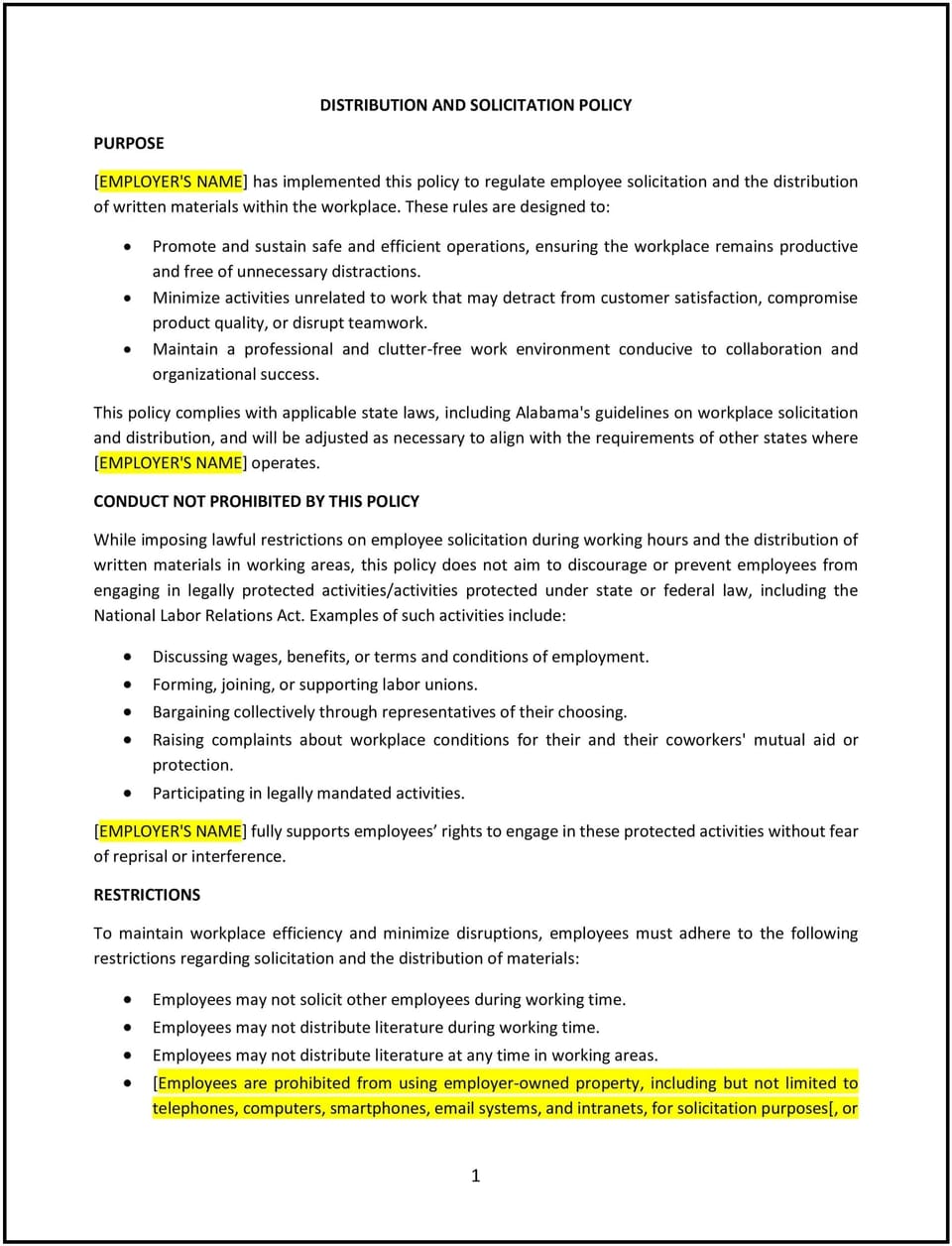Distribution and solicitation policy (Alabama): Free template

Distribution and solicitation policy (Alabama)
A distribution and solicitation policy regulates the distribution of materials and the solicitation of employees, clients, and customers within your business. For SMBs in Alabama, this policy ensures that any solicitation or distribution activities on company premises are conducted in an organized, respectful, and legally compliant manner. Tailoring this policy to your business ensures a balance between maintaining a productive work environment and accommodating the legitimate interests of employees or external parties.
This policy protects your organization from potential disruptions while providing clarity on what is acceptable and permissible.
How to use this distribution and solicitation policy (Alabama)
- Define the scope: Clearly outline the types of complaints your business will address, such as product defects, service delays, or billing disputes.
- Provide a reporting process: Detail how customers can file complaints, whether through an online form, email, phone, or in person.
- Acknowledge complaints promptly: Set expectations for acknowledging complaints, such as responding within 48 hours to assure customers their concerns are being addressed.
- Outline resolution timelines: Include a clear process for investigating and resolving complaints, specifying how long customers should expect to wait for resolution.
- Train employees: Ensure your staff is equipped to handle complaints professionally and empathetically, following the outlined procedures.
Benefits of using a distribution and solicitation policy (Alabama)
A well-defined distribution and solicitation policy ensures that your business can operate smoothly while respecting the rights of employees and external parties. Here’s how it benefits your organization:
- Prevents disruptions: Ensures that distribution and solicitation activities do not interfere with the work environment, minimizing distractions and maintaining productivity.
- Clarifies expectations: Provides clear guidelines on what types of solicitation and distribution activities are allowed, helping to avoid misunderstandings or conflicts.
- Supports legal compliance: Helps your business comply with federal and Alabama-specific labor laws, including employees’ rights to engage in union activities or participate in certain forms of solicitation.
- Protects employee privacy: Ensures that solicitation does not violate employees’ privacy or coerce them into participating in activities they are not comfortable with.
- Maintains workplace harmony: Promotes fairness by setting uniform standards for everyone, preventing undue pressure on employees and reducing workplace tensions.
Tips for implementing a distribution and solicitation policy (Alabama)
- Be specific about prohibited activities: Clearly state any activities that are not allowed, such as political campaigning or distributing literature that promotes a business unrelated to your company’s operations.
- Consider your company’s size and culture: For smaller businesses in Alabama, the policy may need to be more flexible, allowing for community-driven initiatives while still maintaining order and decorum.
- Establish a fair approval system: Ensure the approval process is impartial and transparent, so all employees or external groups feel they have equal opportunity to request permission to solicit or distribute materials.
- Address remote work situations: If you have remote employees, outline how the policy will apply to them, especially if they interact with customers or clients outside the physical office.
- Communicate the policy effectively: Ensure the policy is included in the employee handbook and is shared during onboarding. Regularly remind staff of the policy to prevent violations or misunderstandings.
Q: What types of solicitation are covered by this policy?
A: This policy covers all types of solicitation, including the sale of products, fundraising, political campaigns, and promotional activities that take place on company premises.
Q: Can employees solicit other employees on work time?
A: Generally, solicitation during work hours is prohibited unless it’s related to a company-approved initiative or charity. Employees must seek approval for such activities in advance.
Q: Is the policy applicable to external vendors or organizations?
A: Yes, external parties must also seek permission to solicit or distribute materials on company premises. This ensures that all solicitation activities are regulated fairly.
Q: How should employees request approval for solicitation or distribution?
A: Employees or external parties should submit a formal request to the designated department (HR, management) detailing the nature of the solicitation or distribution, including the time, location, and purpose.
Q: Can employees distribute literature in common areas like break rooms or parking lots?
A: Distribution in common areas is allowed only if it does not disrupt operations or violate the policy’s guidelines. Employees must obtain approval before engaging in these activities.
Q: What happens if the policy is violated?
A: Violations of the policy may result in disciplinary action, including warnings or more serious consequences depending on the severity of the disruption or infringement.
This article contains general legal information and does not contain legal advice. Cobrief is not a law firm or a substitute for an attorney or law firm. The law is complex and changes often. For legal advice, please ask a lawyer.


